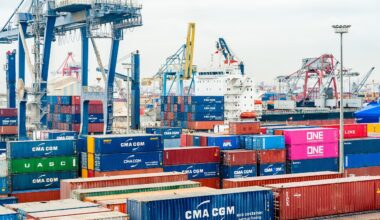Understanding the Role of Export Credit Agencies in Buyers’ Credit
Export Credit Agencies (ECAs) play a pivotal role in facilitating international trade by providing risk mitigation for buyers’ credit. By acting as intermediaries, these organizations bridge the risk gap between exporters and importers. For exporters, particularly small and medium enterprises, navigating the global market can seem daunting due to financial constraints and potential payment defaults. ECAs help alleviate these concerns by guaranteeing payment to exporters, thus enabling them to offer more competitive credit terms to buyers. This assurance encourages exporters to engage in new markets that would otherwise be too risky without support. Furthermore, ECAs are often government-backed, providing an additional layer of security for both parties involved in a transaction. With such backing, exporters feel more confident in extending credit, facilitating greater trade flows and new market penetration. Notably, the support of ECAs can lead to increased export volumes, fostering economic growth in the exporting country while ensuring the financial stability of the importing country. Overall, the inclusion of ECAs in buyers’ credit arrangements creates a win-win scenario for all stakeholders involved.
In the context of buyers’ credit, ECAs also alleviate the financing challenges faced by foreign purchasers. These agencies are instrumental in providing financing solutions that allow buyers to pay for imports in manageable installments. This arrangement is particularly beneficial for developing countries that may lack access to sufficient capital or favorable financing conditions. By extending credit terms, ECAs help importers purchase necessary goods and services without straining their cash flows. Moreover, ECAs often collaborate with banks and financial institutions to structure tailored financing options that suit the specific needs of buyers. This synergy between the ECA and financial institutions facilitates smoother transactions and ensures that buyers have quick access to the necessary funds. Additionally, financing through an ECA often comes with lower interest rates, making it a more attractive option for buyers compared to traditional loan facilities. The overall impact of ECAs in providing buyers’ credit extends beyond just financing; it strengthens trade relationships and promotes long-term partnerships between exporters and importers, contributing to sustainable economic growth.
The Benefits of ECA Support for Exporters
For exporters, the backing provided by Export Credit Agencies translates to several key benefits that enhance their operational capabilities. Firstly, ECAs offer insurance against political and commercial risks that can emerge in international trade. This protection is essential for exporters operating in politically unstable countries, as it mitigates potential losses and encourages them to expand market reach despite inherent risks. In addition, ECAs provide guarantees that can help exporters obtain financing from local banks, smoothing out cash flow issues that might arise otherwise. Securing financing often remains a primary challenge for many exporters, particularly those looking to increase production to meet the demands of an expanding market. With ECA support, exporters can leverage guarantees to access funds that might otherwise be unattainable. Furthermore, the ability to extend credit terms, facilitated by ECAs, allows exporters to become more competitive in bidding for international contracts. With more favorable credit arrangements in place, exporters can attract more customers, increasing their potential market share and overall revenue generation.
Moreover, the global economic landscape has seen increased collaboration among ECAs resulting in more robust frameworks for buyers’ credit financing. As global trade evolves, trade disputes become more common, and therefore, a unified approach by ECAs allows for a standardized system that promotes fairness and transparency. Through bilateral agreements, ECAs share information on best practices concerning risk assessment and transaction structuring. Such cooperation not only enhances the credibility and stability of international trade finance but also empowers exporters and importers to engage in cross-border transactions with heightened confidence. Furthermore, joint initiatives by ECAs are instrumental in promoting sustainable development practices within trade financing. This focus on sustainability includes environmental considerations, which have become increasingly important in contemporary trade discussions. Consequently, by aligning financing criteria with sustainability goals, ECAs enable exporters and importers to engage in eco-friendly transactions, fostering a greener and more sustainable world economy. The shared vision among ECAs indeed enhances the overall effectiveness of buyers’ credit financing on an international scale.
Challenges faced by Export Credit Agencies
Despite their critical role, Export Credit Agencies encounter various challenges that can hinder their effectiveness in supporting buyers’ credit initiatives. One significant challenge is the fluctuating political environment, which can severely impact the risk assessments conducted by ECAs. Political instability in an importing country directly affects the perception of risk, leading some ECAs to restrict their engagement or tighten financing conditions. Such constraints might limit the availability of financing options for buyers and adversely affect their ability to procure essential goods and services. Another challenge is competition among ECAs, which may lead to a race to the bottom regarding underwriting standards. While aggressive competition can enhance affordability, it might put financial stability at risk if agencies compromise on due diligence to attract business. Furthermore, evolving global economic conditions necessitate a shift in the strategic approach among ECAs. For instance, as more businesses prioritize sustainability, ECAs need to adapt to these changing preferences while still ensuring economic viability in their financing solutions. Addressing these challenges requires continuous dialogue among stakeholders to refine policies and practices within the buyers’ credit landscape.
Additionally, the advent of technology is challenging Export Credit Agencies to evolve their processes and policies. Digital transformation spreads across various industries, including finance, and ECAs must keep pace with innovations reshaping transactions and customer expectations. Embracing technology can streamline risk assessments, improve data analytics, and enhance customer engagement. By adopting digital tools, ECAs can provide quicker responses to buyers’ credit inquiries while ensuring accuracy and maintaining robust compliance with regulations. Moreover, technological advancements also create opportunities for enhanced transparency within the supply chain. By promoting greater visibility through innovative tools, ECAs can build trust among exporters and importers, making transactions smoother. However, investment in technology requires substantial resources and readiness to adapt to new operational paradigms. As such, ECAs benefit from fostering collaborations with tech firms and leveraging fintech solutions to enhance their offerings. The ultimate goal is to provide a seamless experience for exporters and buyers when accessing credit facilities. The incorporation of technology is not merely a trend; it is becoming essential for ECAs to maintain relevance in a competitive and rapidly evolving global marketplace.
The Future of Buyers’ Credit with ECAs
Looking ahead, the role of Export Credit Agencies in the buyers’ credit landscape is poised to grow significantly. There remains a strong demand for financing solutions that support international trade amidst evolving economic conditions and ongoing trade tensions. As countries establish more favorable trade agreements and aim for economic recovery post-pandemic, ECAs will become vital in facilitating these transitions by providing essential financial backing to exporters and importers alike. Furthermore, the focus on sustainability will shape the future of buyers’ credit. With increasing awareness of environmental issues, ECAs will be expected to incorporate green financing practices into their frameworks. This shift not only supports international commitments to combat climate change but also positions ECAs as champions of sustainable development in global trade. Continued dialogue and collaboration among ECAs, financial institutions, and other stakeholders will be essential to foster innovations that align financing with sustainable practices. Ultimately, a proactive approach to adapting to the changing global landscape will enable ECAs to maximize their impact in the buyers’ credit segment, navigating challenges while fostering trade growth.
In conclusion, the significance of Export Credit Agencies in buyers’ credit is undeniable. They provide essential support that helps exporters and importers navigate the complexities of international finance while promoting sustainable practices. By mitigating risks and facilitating financial access, ECAs empower businesses to capitalize on global opportunities, ensuring their competitiveness in diverse markets. The resultant increase in trade volumes not only stimulates economic growth but also strengthens economic ties among countries. However, for ECAs to continue thriving, they must remain agile in the face of challenges posed by political uncertainties, competition, and technological advancements. Addressing these issues proactively will be pivotal in ensuring that ECAs can adapt effectively to the evolving landscape of international trade finance. As the world continues to change, the role of ECAs will be crucial in fostering resilient partnerships, bridging financing gaps, and supporting sustainable development. The collaboration among ECAs, exporters, buyers, and other stakeholders will play a central role in shaping the future dynamics of buyers’ credit. In summary, embracing innovation while staying committed to supporting international trade will solidify the essential function of ECAs moving forward.








